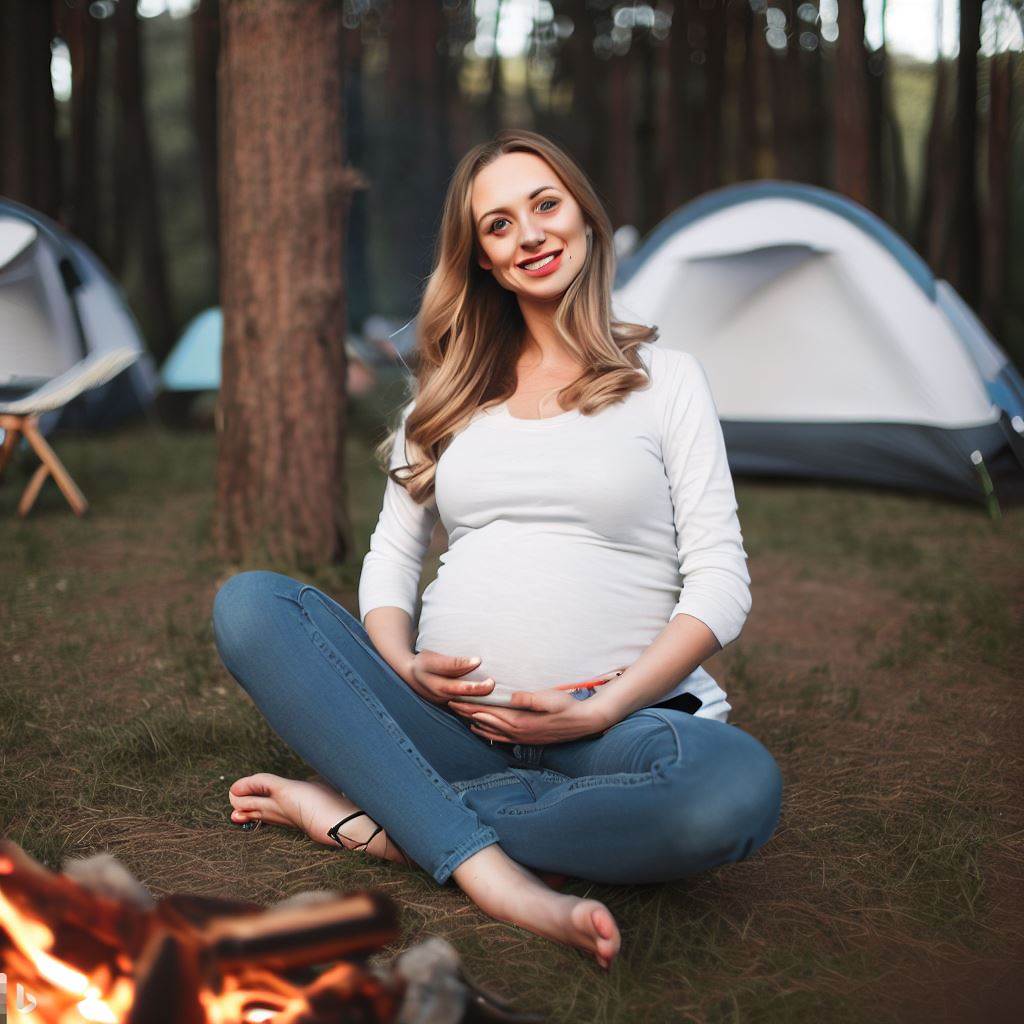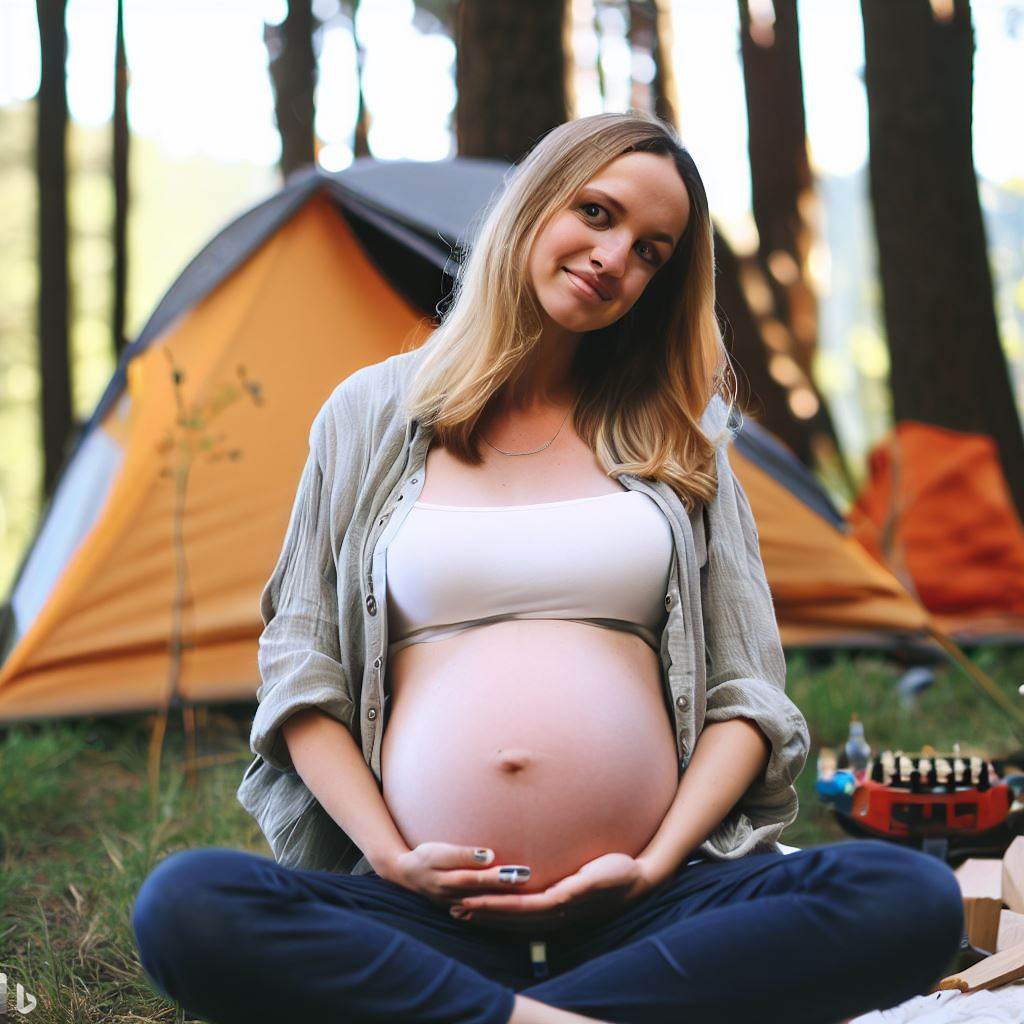If you’re like me and love the freedom of camping, there’s no reason to put it on hold just because there’s now a baby on board. I know what you might be thinking: Pregnancy and camping? Isn’t that a recipe for discomfort? But hear me out!
We’ll need to tweak our routines slightly – think less cliff scaling, and more gentle hiking. But fear not, you’re not trading tents for hotel rooms just yet! Curious how this adventure unfolds? Stick around as I unveil an insider’s guide to pregnancy camping, full of unexpected joys and bumps along the way.
So lace up those hiking boots (while you still can see your feet) and let’s embark on this exciting journey together – proving once again that pregnant or not, women are unstoppable forces of nature!
Here is an exciting article you might be interested in pull behind slit seeder

Preparation Before the Trip: Health Checkups, Vaccinations, and Medical Supplies
Preparing for a camping trip during pregnancy requires special attention to your health. It is crucial to schedule regular checkups with your healthcare provider before embarking on any outdoor adventure.
Discuss your plans with them and ensure you are physically fit for such activities.
Moreso, vaccinations are essential in protecting both the mother and the baby from potential diseases. So make sure all necessary vaccinations are up-to-date and consider additional vaccines if needed for specific regions or environments you will be visiting.
Pack an adequate supply of essential medical items such as:
- prenatal vitamins
- pain relievers recommended by your doctor
- sunblock safe for pregnant women
- insect repellent that is non-toxic
- antacids in case of heartburn
- any other prescribed medications.
Remember to bring important documents like medical records and emergency contact information in case of unforeseen circumstances.
Choosing the Right Campsite: Considerations for Pregnant Women
When selecting a campsite while pregnant, it’s crucial to prioritize safety and comfort. Opt for well-established campgrounds that have proper amenities like clean restroom facilities nearby.
Look out for campsites that offer easy accessibility without strenuous hikes or difficult terrains.
Again, consider campsites close to water sources as hydration is vital during pregnancy. Additionally, choose locations where there is minimal exposure to potentially harmful insects or animals.
You can also explore reviews or ask experienced campers about their recommendations regarding safe grounds suitable for expecting mothers.
Risks Of Camping While Pregnant
While camping can be an enjoyable experience during pregnancy, it’s important to acknowledge the potential risks involved:
1) Increased risk of falls due to uneven terrain – Be mindful of where you walk and wear appropriate footwear.
2) Exposure to extreme temperatures – Pregnant women are more sensitive to extreme heat or cold. Ensure you have suitable clothing and gear for various weather conditions.
3) Limited access to medical facilities – Remote camping areas may not have immediate access to emergency healthcare. Plan accordingly by having the necessary supplies and knowledge of basic first aid.
4) Increased susceptibility to insect bites and tick-borne diseases – Use effective insect repellents, wear long-sleeved clothing, and avoid camping in areas known for high bug activity.
Adapting Camping Activities During Pregnancy
While pregnant, it’s essential to adapt your camping activities according to your comfort level. Consider the following tips:
1) Limit strenuous physical activities such as intense hiking or carrying heavy loads.
2) Engage in moderate exercises like prenatal yoga, stretching, or walking that promote circulation without excessive strain on the body.
3) Prioritize relaxation activities such as reading a book under a shaded tree or practicing meditation amidst nature’s soothing ambiance.
Healthy Eating While Camping: Optimizing Nutrition for Pregnant Women
Maintaining a healthy diet during camping is crucial for expecting mothers. Here are some tips:
1) Pack plenty of fresh fruits and vegetables that provide essential vitamins and minerals.
2) Choose protein-rich snacks like nuts, lean meats, or dairy products.
3) Stay hydrated by drinking an ample amount of water throughout the day.
Pregnancy-Friendly Tents
Investing in a pregnancy-friendly tent can significantly enhance your comfort during outdoor adventures.
Look for tents with sufficient space allowing you to move around easily. Furthermore, opt for models with good ventilation systems that prevent overheating during warm nights.
Appropriate Clothing Choices To Protect Against Environmental Factors
Wearing appropriate clothing while pregnant ensures protection against environmental factors like sun exposure and bugs:
1) Opt for loose-fitting clothes made of lightweight and breathable fabrics to prevent overheating.
2) Wear long-sleeved shirts, long pants, and closed-toe shoes to minimize the risk of insect bites or sunburns.
3) Use a wide-brimmed hat and apply pregnancy-safe sunscreen with at least SPF 30.
Handling Emergencies During A Camping Trip For Pregnant Women
While camping, it is crucial to be prepared for any emergencies that may arise. Follow these tips:
1) Familiarize yourself with the nearest emergency services and know how to communicate your location effectively.
2) Carry a fully stocked first aid kit that includes basic supplies like band-aids, antiseptic solutions, tweezers for splinters or ticks removal, etc.
3) Inform fellow campers about your pregnancy so they can provide immediate assistance if needed.
Ensuring Adequate Rest And Relaxation For Expecting Mothers In Outdoor Settings
Rest is essential during pregnancy for both the physical and mental well-being of expecting mothers. Here’s how you can ensure sufficient rest while camping:
1) Set up a comfortable sleeping area by using thick sleeping pads or air mattresses to cushion pressure points.
2) Bring pillows designed to support pregnant bodies and promote proper spine alignment while sleeping.
3) Allocate time for breaks throughout the day where you can sit back, relax, and enjoy nature’s beauty.
Avoiding High-Risk Activities While Camping When Pregnant
To prioritize safety during camping trips while pregnant:
1). Avoid activities such as horseback riding or water sports that pose an increased risk of falls or injury.
2). Stay away from areas known for high wildlife activity or potential encounters with dangerous animals.
Tips On Hygiene Maintenance During Pregnancy-Focused Camp Trips
Maintaining good hygiene is vital during pregnancy. Here are some tips:
1) Regularly wash your hands with soap and water, especially before preparing or eating food.
2) Use baby wipes or gentle cleansing products to keep yourself fresh when shower facilities are limited.
3) Dispose of waste properly by following proper camping etiquette, including packing out used sanitary items in provided waste bags.

Weather Conditions: Guidance For An Expectant Mother’s Exposure
Consider the weather conditions while planning a camping trip during pregnancy:
1) Avoid extreme temperatures by checking the forecast beforehand. Pack appropriate clothing layers for hot or cold climates.
2) Stay cool and hydrated during hot weather by seeking shade, wearing loose-fitting clothes, and drinking plenty of water.
3) Protect against harsh weather elements like wind or rain by having waterproof gear and adequate shelter.
Summary
Camping can be an exciting experience for expecting mothers. By following safety precautions, adapting activities to your comfort level, and prioritizing nutrition and rest, you can enjoy memorable outdoor adventures while pregnant.
Remember to consult your healthcare provider before embarking on any new physical activities during pregnancy. Happy camping!
FAQs On pregnancy camping
Q: Can I go camping while pregnant?
A: Absolutely! Camping while pregnant can be a wonderful experience, as long as you take some precautions and listen to your body.
Q: What trimester is the best for camping?
A: The second trimester is often considered the best time for camping while pregnant. By this time, morning sickness is usually gone, and you have more energy.
Q: Are there any tips for camping while pregnant?
A: Yes, here are a few tips for camping while pregnant: make sure to pack comfortable camping gear, stay hydrated, and take it easy with physical activities.
Q: Can I go camping in my first trimester?
A: It is generally safe to go camping in your first trimester, but it’s a good idea to consult with your doctor or midwife before planning any outdoor activities.
Q: Is it safe to camp during pregnancy?
A: Camping during pregnancy is generally safe, especially if you have a low-risk pregnancy. However, it’s important to take precautions and listen to your body.
Q: What should I consider bringing when camping while pregnant?
A: When camping while pregnant, you may want to consider bringing items such as a pregnancy pillow, comfortable sleeping bag or mat, bug spray, and healthy snacks.
Q: Can I go camping in my third trimester?
A: Camping in your third trimester can be more challenging due to discomfort and decreased mobility. It’s best to consult with your healthcare provider before planning any camping trips during this time.
Q: How can I make sure I stay comfortable while camping?
A: To stay comfortable while camping while pregnant, consider investing in a comfortable air mattress, bringing a pregnancy pillow, and wearing loose and breathable clothing.
Q: Is it safe to have a campfire while pregnant?
A: As long as you take precautions and stay a safe distance away from the fire, having a campfire while pregnant is generally safe. Avoid inhaling smoke directly and make sure to stay hydrated.
Q: What are some important things to consider when camping during pregnancy?
A: Some important things to consider when camping during pregnancy include staying hydrated, avoiding activities that could put you at risk for injury, and packing a well-stocked first aid kit.